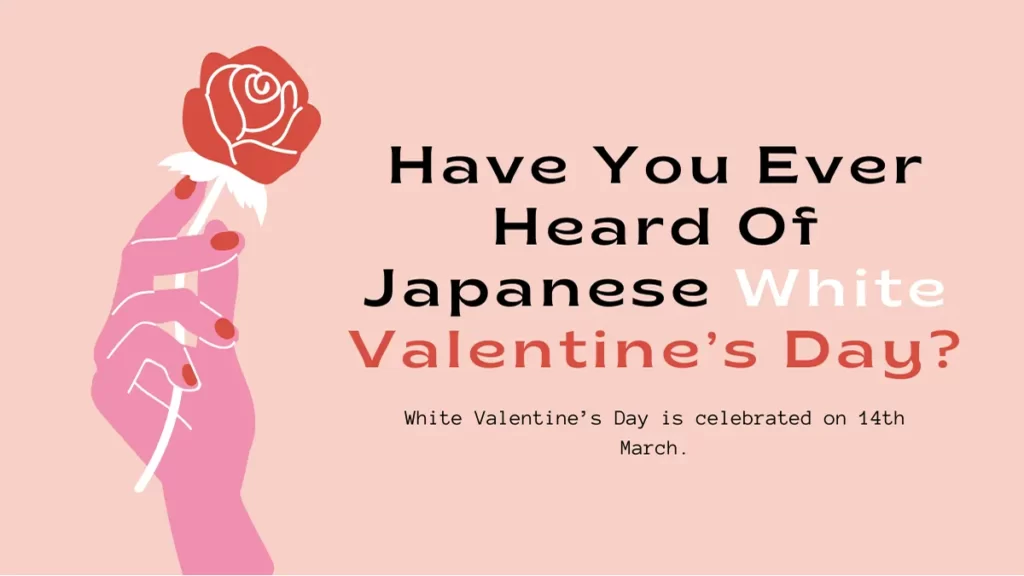Valentine’s Day is celebrated around the world on February 14 every year. Usually, it is a day for couples to get together, exchange gifts and chocolates, and celebrate their affection for each other. However, Japan does it unexpectedly.
In Japan, South Korea, Taiwan, and some China regions, women give gifts, including chocolates and cookies, to their male colleagues, crush, partner, and friends on Valentine’s Day. After a month, White Valentine’s Day is celebrated on March 14. On this holiday, men return or “reply” to those who gifted them on Valentine’s Day by giving them a gift of their own.
It’s an extraordinary chance to show appreciation to an exceptional woman in your day-to-day existence and to have a great time too. In this article, we clarify the what is it, beginning of this holiday, why it is named “white day” and what to gift on this Day.
What is white valentines day in japan?
White Valentine’s Day occurs a month after Valentine’s Day in which men give women a gift worth three times the value of the gift received by them.
How it all begins?
White Day is the creation of a small confectionery shop, Ishimura Manseido, in the Hakata district during the 1970s. In 1977, an organization executive, Zengo Ishimura, was perusing a women’s magazine searching for motivation. One letter caught his eye.
A lady expressed, “It’s not reasonable that men get chocolate from women on Valentine’s Day, yet they don’t give back. For what reason don’t they give us something? A handkerchief, candy, even marshmallows….”
Ishimura contemplated, assuming women would be glad to get even marshmallows in return for their Valentine’s Day gifts, why not invent a special day for men with the goal that they could offer their thanks? He likewise devised another sweet to express that feeling, made of marshmallow paste with chocolate stuffed inside.
At an organization meeting, he requested that the female workers pick a day for ladies to get treated with gifts; March 14, precisely one month later, Valentine’s Day, was the victor. In 1978, with the participation of a local department store, Iwataya, the absolute first “White Day” was celebrated, however under the name “Marshmallow Day.” The store later proposed changing the title to the more open-ended “White Day,” a reference to the marshmallow, and in this manner, a custom was born.
Why is it named “White Day”?
The color white symbolizes purity and is closely associated with an innocent type of teenage love in Japanese culture, hence the name “White Day.”
What gifts can we give on White Day?

You should give a gift to any woman who gave one to you. However, inform the women whether you need to be simply friends or something more. Return “Giri” gifts with similar things, like teddy bears or chocolate. Pick something unique for a “Honmei” gift, like lingerie, purse, or jewelry.
White flowers like lilies, peonies, and orchids are wonderful White Day gifts.
Bath bombs, perfume, body mist, moisturizer, scented soap, candles, or other shower accessories are great White Day gifts. Pick something with a lovely smell and a beautiful name.
Marshmallows, cookies, candies, and other sweets are trendy gifts for White Day. But each dessert has its unique meaning. If you’re going to gift this white Day – you’ll want to pay attention!
Marshmallows
Initially, chocolates covered in marshmallows were thought to represent a girls’ sentiments addressed as chocolate got once again shrouded in pure love (marshmallows). In any case, presently, since marshmallows will quite often liquefy and dissolve rapidly, they are currently regularly connected with feelings of unrequited or transient love.
Cookies
It May appear somewhat senseless – but since cookies are crunchy, they’re thought to address an “easygoing” or “dry” relationship. Likewise, they are commonly given as a gift to individuals viewed as “just friends.”
Candies
Candy genuinely signifies “I love you”! As candy is something that you hold in your mouth while relishing the sweet taste for a more extended period, addressing your affections for one another! Sweet and intended to endure!
However, all of these meanings are relative to place, person, and even generation, so it is common for Japanese people to be unaware of the meanings assigned here. So don’t be discouraged if your crush gives you marshmallows or cookies! They probably mean well.



